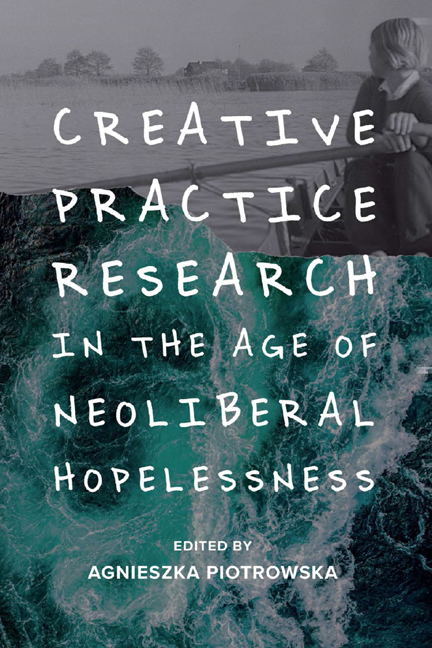Book contents
- Frontmatter
- Contents
- List of Figures
- Notes on Contributors
- Acknowledgements
- Preface: Life in the Post Pandemic Age
- Dedication
- 1 Introduction: Complexities, Compromises and Complicities
- 2 Against the Grain: Women Film Practitioners and Theorists Talk Creative Practice and Theory
- 3 Married to the Eiffel Tower: Notes on Love, Loss and Knowledge
- 4 Creativity and Neoliberalism: Between Autonomy, Resistance and Tactical Compliance
- 5 Tactical Compliance and the Persistence of Elsaesser
- 6 Storytelling and Game Playing
- 7 Autonomy and the Other Woman: Queer Active Agency and Postcolonial Expectations
- 8 From Neolithic to Neoliberal
- 9 First-person Expression on ‘Non-Western’ Screens: China as a Case Study
- 10 Scholarly Exploration of the Creative Process: Integrating Film Theory and Practice
- 11 Teaching Practice as Theory: Guerrilla Filmmaking
- 12 Baits of Falsehood: The Role of Fiction in Documentary or From Untheorised Practice to Unpractised Theory
- 13 Repented: A Creative Intersemiotic Translation
- Notes on Repented
- 14 How do you see me? The Camera as Transitional Object in Diasporic, Domestic Ethnography
- 15 ‘Shut Your Hole, Girlie. Mine's Making Money, Doll’: Creative Practice-Research and the Problem of Professionalism
- 16 Feminist ‘Pensive-creative Praxis’ and Irigaray: A Porous, Dialogical Encounter
- 17 The Paths of Creation, or How Can I Help my Dybbouk to Get Out of Me?
- 18 ‘We Want to Kill Boko Haram’: Reflections on the Photographic Representation of Children in a Displacement Camp
- 19 Between ‘Counter-movement’ (Ingold) and ‘Living with Ghosts’ (Demos)
- 20 Screen Memories: A Video Essay on Smultronstället/Wild Strawberries
- Index
19 - Between ‘Counter-movement’ (Ingold) and ‘Living with Ghosts’ (Demos)
Published online by Cambridge University Press: 17 October 2020
- Frontmatter
- Contents
- List of Figures
- Notes on Contributors
- Acknowledgements
- Preface: Life in the Post Pandemic Age
- Dedication
- 1 Introduction: Complexities, Compromises and Complicities
- 2 Against the Grain: Women Film Practitioners and Theorists Talk Creative Practice and Theory
- 3 Married to the Eiffel Tower: Notes on Love, Loss and Knowledge
- 4 Creativity and Neoliberalism: Between Autonomy, Resistance and Tactical Compliance
- 5 Tactical Compliance and the Persistence of Elsaesser
- 6 Storytelling and Game Playing
- 7 Autonomy and the Other Woman: Queer Active Agency and Postcolonial Expectations
- 8 From Neolithic to Neoliberal
- 9 First-person Expression on ‘Non-Western’ Screens: China as a Case Study
- 10 Scholarly Exploration of the Creative Process: Integrating Film Theory and Practice
- 11 Teaching Practice as Theory: Guerrilla Filmmaking
- 12 Baits of Falsehood: The Role of Fiction in Documentary or From Untheorised Practice to Unpractised Theory
- 13 Repented: A Creative Intersemiotic Translation
- Notes on Repented
- 14 How do you see me? The Camera as Transitional Object in Diasporic, Domestic Ethnography
- 15 ‘Shut Your Hole, Girlie. Mine's Making Money, Doll’: Creative Practice-Research and the Problem of Professionalism
- 16 Feminist ‘Pensive-creative Praxis’ and Irigaray: A Porous, Dialogical Encounter
- 17 The Paths of Creation, or How Can I Help my Dybbouk to Get Out of Me?
- 18 ‘We Want to Kill Boko Haram’: Reflections on the Photographic Representation of Children in a Displacement Camp
- 19 Between ‘Counter-movement’ (Ingold) and ‘Living with Ghosts’ (Demos)
- 20 Screen Memories: A Video Essay on Smultronstället/Wild Strawberries
- Index
Summary
It might, perhaps, seem paradoxical to offer an academic essay about creative research, as if one had already supposed what might be required of an essay, rather than seeing it as a matter of and for such research itself. Is there, for instance, a risk that the expected conventions of such an essay (addressing what Adorno called the ‘academic guild’ (1991: 3)) might occlude the very question of research that it is intended to explore? This concerns not so much ‘form and content’ as, rather, the way in which de- and re-contextualisation (regarding citations or examples) resonate with the creative work being discussed. If that work concerns a medium other than discursive writing – and is not itself engaged in creative writing (but, nonetheless, in the work of essaying knowledge) – how might this be evidenced in an article such as this? How might the understanding of an essay engage with a film montage, for example, to explore questions of research in terms, precisely, of its own creative practice? What new knowledge might derive from the relation between montage (at least, in its concept) and its elaboration in prose; in the relation between essay and film? Rather than an essay on or about film, then, what if the research in question concerns, precisely, the practice of essay-film?
Besides the already cited discussion by Adorno, my reflections here could also be introduced with reference to Whitehead and Ingold – as examples of and for thinking through relations between science and art; not least (with the Ingold example), at a time when research within universities is often obliged to attend to evaluative criteria that leave little scope for what could be called creative. In terms of a manifesto, Ingold writes: ‘What I have witnessed, over these decades, is the surrender of science to the forces of neoliberalism. And to find a counter-movement in the contemporary world, we have to turn not to science but to art’ (Ingold 2016: 10). The ‘two cultures’ environment, in which science and art are conceived of separately (especially in the ways by which they are funded), finds a powerful contrast in the evocative prose of Whitehead: ‘The creativity of the world is the throbbing emotion of the past hurling itself into a new transcendent fact’ (Whitehead, 1967: 177).
- Type
- Chapter
- Information
- Creative Practice Research in the Age of Neoliberal Hopelessness , pp. 288 - 303Publisher: Edinburgh University PressPrint publication year: 2020



